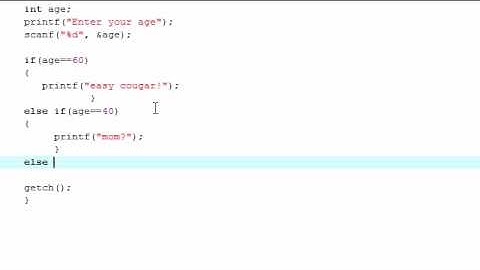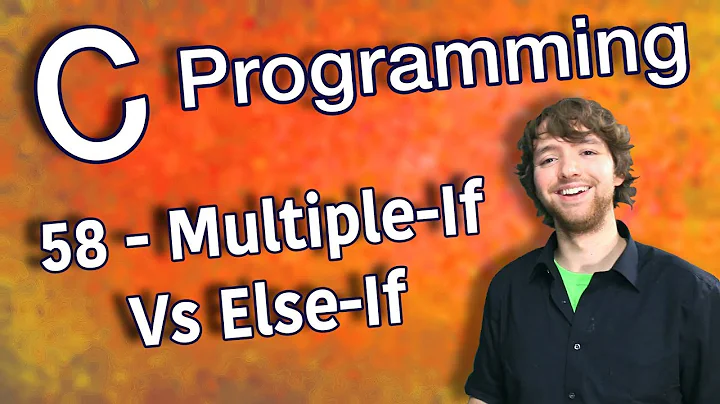if/else and if/elseif
Solution 1
Situation a:
if( condition )
{
}
else
{
}
When the condition in the above statement is false, then the statements in the else block will always be executed.
Situation b:
if( condition )
{
}
else if( condition2 )
{
}
else
{
}
When 'condition' is false, then the statements in the else if block will only be executed when condition2 is true. The statements in the else block will be executed when condition2 is false.
Solution 2
Without "elseif" syntax you would have to write chain if-statements for processing one of several possible outcomes this way:
if( str == "string1" ) {
//handle first case
} else {
if( str == "string2" ) {
//handle second case
} else {
if( str == "string3" ) {
//handle third case
} else {
//default case
}
}
}
instead you can write
if( str == "string1" ) {
//handle first case
} else if( str == "string2" ) {
//handle second case
} else if( str == "string3" ) {
//handle third case
} else {
//default case
}
which is completely the same as the previous one, but looks much nicer and is much easier to read.
Solution 3
Emphasizing what Gumbo said.
Also, if a language has a real elif / elsif / elseif (say, a "real" else-if instruction, instead of a kind of nested chaining hidden away by formatting), then the compiler can easly emit a single node in an Abstract Syntax Tree (or similar, see http://en.wikipedia.org/wiki/Abstract_syntax_tree) instead of nesting them.
To give an example:
Say in C/C++ you have:
if (a) {
X
} else if (b) {
Y
} else if (c) {
Z
} else {
0
}
Then the compiler will build an AST-node like this:
a
/ \
X b
/ \
Y c
/ \
Z 0
But if the language of choice has a real if-else:
if (a) {
X
} elif (b) {
Y
} elif (c) {
Z
} else {
0
}
Then the AST could more easily look like this:
(a--b--c)
/ / / \
X Y Z 0
In such a language, an "if else" would only be possible if braces are not mandatory:
if (a) {
X
} elif (b) {
Y
} else if (c) { // syntax error "missing braces" if braces mandatory
Z
} else {
0
}
Corresponding AST (if braces are not mandatory):
(a--b)
/ / \
X Y c
/ \
Z 0
This could make CFG-Analysis (http://en.wikipedia.org/wiki/Control_flow_graph) easier to implement (though there might be no actual optimization benefit; so imho it'd just benefit the lazy programmer :D).
Solution 4
Many languages have a grammer like this (here: ECMAScript Language Specification, so JavaScript):
IfStatement :
if (Expression)StatementelseStatement
if (Expression)StatementStatement :
Block
VariableStatement
EmptyStatement
ExpressionStatement
IfStatement
IterationStatement
ContinueStatement
BreakStatement
ReturnStatement
WithStatement
LabelledStatement
SwitchStatement
ThrowStatement
TryStatementBlock :
{StatementListopt}StatementList :
Statement
StatementList Statement
So the branches of an ifStatement may contain a block of statements (Block) or one of the other statements (other than Block). That means this is valid:
if (expr)
someStatement;
else
otherStatement;
And as StatementList may just contain a single statement, these examples are equivalent to the previous:
if (expr) {
someStatement;
} else {
otherStatement;
}
if (expr)
someStatement;
else {
otherStatement;
}
if (expr) {
someStatement;
} else
otherStatement;
And when we replace otherStatement by an additional IfStatement, we get this:
if (expr) {
someStatement;
} else
if (expr) {
someOtherStatement;
}
The rest is just code formatting:
if (expr) {
someStatement;
} else if (expr) {
someOtherStatement;
}
Solution 5
else if basically means the else part of if is another if statement.
Related videos on Youtube
sharptooth
Updated on April 17, 2022Comments
-
sharptooth about 2 years
If I have a statement block like this:
if (/*condition here*/){ } else{ }or like this:
if (/*condition here*/) else if (/*condition here*/) {} else if (/*condition here*/) {}What is the difference?
It seems that with if/else, if part is for true state and the else part is for all other possible options (false). An else-if would be useful for a number of conditions. This is my understanding, is there anything more I should be aware of?
-
 Romias about 15 yearsThe second case... the elseif one... is just like a Switch Case
Romias about 15 yearsThe second case... the elseif one... is just like a Switch Case -
sharptooth about 15 yearsExactly, but it is widely used and switch statement cannot be used for strings.
-
Peter Ajtai almost 14 years@sharpooth - They can in PHP and others I'm sure.
-
greenoldman over 9 yearsNo true, because with such syntax
else ifis side-effect (i.e. it comes for free). In other words there is noelse ifsyntax, there is onlyifandelsehere. -
sharptooth over 9 years@greenoldman: Yes, you're right that it comes for free, however it is hardly a "side-effect" in language Standard terms, it's just a way of organizing code.
-
greenoldman over 9 years@sharptooth, I meant it is side-effect, because if you design "if-else" in C-style, you will get
else ifand you don't have to make any change to syntax, correct? Compare this to Ruby/Perl/Python etc (the languages with blocks), and you have add new rules to syntax (unless you don't mind increased nesting). -
sharptooth over 9 years@greenoldman: Sure, except C++ Standard (1.9/7 in C++03) defines side-effects as changes in the state of the execution environment and the
if-else-ifchain behaves the same no matter how you indent it.






![PowerShell Tutorial 6 : If, elseif, else [Beginners]](https://i.ytimg.com/vi/cacCnvVqiw0/hq720.jpg?sqp=-oaymwEcCNAFEJQDSFXyq4qpAw4IARUAAIhCGAFwAcABBg==&rs=AOn4CLAvQsKDfJSKKxTyf9VUfS4MS-iqUA)